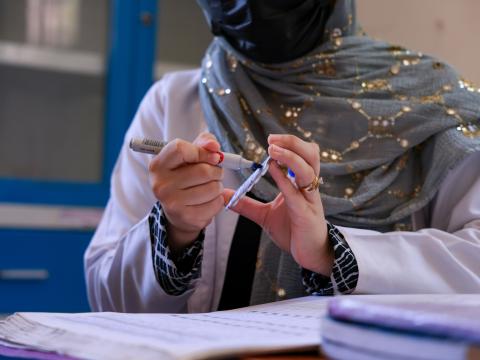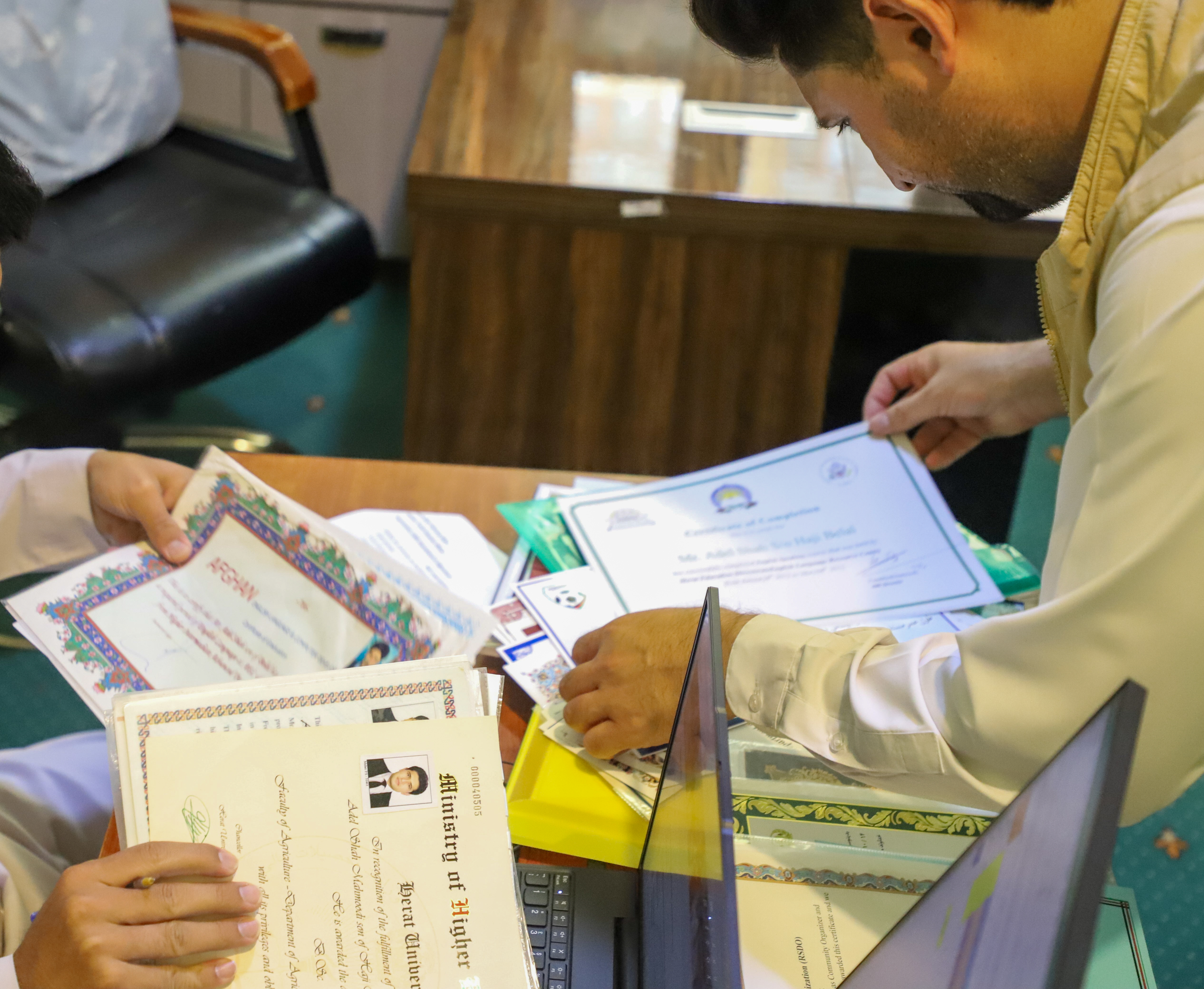Amina’s Journey: Joining World Vision Afghanistan

Meet Amina. She's always dreamed of serving the most vulnerable people in her community. When she hears of a vacancy at World Vision Afghanistan (WVA), she decides to apply – and so begins her recruitment journey.
Step 1: The Vacancy
Amina first spots the vacancy on Agency Coordinating Body for Afghan Relief & Development's (ACBAR) website, where she regularly checks for opportunities.
Every WVA posting carries the same line: “Local and female candidates are highly encouraged to apply.” This alone gives her confidence.
WVA advertises different types of contracts on ACBAR: standard, stipend and daily roles. We also post labour contracts managed directly by the admin team, and roles with standard contracts on WV's internal system, Workday.
Amina applies for a stipend role and emails her application. In remote districts where internet is scarce, hiring managers even collect applications by hand.
One of World Vision's People & Culture (P&C) colleagues explains: “If we have a vacancy in Chesht-e-Sharif district, we post it in both English and local languages so candidates can apply.” Senior vacancies stay open for a month; most other posts, including Amina’s, close after two weeks.
Step 2: The Competition
Amina knows she’s not alone. For entry-level jobs, there are often 500–600 applicants; mid-level roles receive around 350; senior posts, 150–250.
In some provinces like Faryab, Ghor and Badghis, public announcements have at times faced restrictions from authorities. In those cases, vacancies were shared internally within staff networks. Fortunately for Amina, public advertising has recently resumed in these areas (except in Ghor), giving her and many others a fair chance.
Step 3: Screening and Shortlisting
After the deadline passes, the P&C team starts screening applications. With so many CVs, sometimes two or three staff share the workload. Typically, around 50 candidates make the longlist.
Amina’s application matches the job requirements, and she makes it through. Now a shortlisting committee – made up of technical staff and the hiring manager – decide who progresses further.
For technical posts, shortlisting takes three to seven days. For support roles, the hiring manager may handle them alone.
Amina learns that practical experience is valued highly: “For the committee or hiring manager, education is important, but practical experience often carries more weight,” says one WV Afghanistan recruiter. “Sometimes a master’s degree holder is not shortlisted, while someone with stronger field experience is.”
P&C may also flag overqualification, particularly for stipend or short-term roles, as retention can be a concern.
Step 4: Tests and Interviews
Amina receives an email: she’s shortlisted! 48 hours later, she sits the written test. It’s challenging, but she performs well. Another 48 hours later, she’s invited to the interview.
She’s nervous walking into the room, but the environment is welcoming and supportive. The panel includes:
- A P&C representative
- The hiring manager
- A technical focal point
- A safeguarding representative
- At least one female panel member
This diversity is deliberate, designed to ensure fairness. After the interview, her scores are sent to the P&C Director and National Director for review.
Step 5: The Waiting and the Checks
While she waits, P&C verifies her references and background. Every candidate’s qualifications and employment history are carefully checked; fabricated experience or false information leads to automatic disqualification.
The entire recruitment process usually takes 30–45 days. For senior or more complex posts, it can take longer.

Safeguards Along the Way
Throughout, Amina sees that WVA takes fairness seriously. Safeguards are built into each stage:
- Diverse panels with representation from multiple functions and at least one woman.
- Blind scoring of written tests, assessed without names.
- Independent oversight, where third parties sometimes join interviews or re-score tests.
- Conflict of interest policies, excluding anyone with ties to a candidate.
- Complaint handling – if an applicant raises concerns, P&C investigates and may re-score.
- International staff participation in senior role recruitment for added neutrality.
As one colleague puts it: “We want every candidate to feel their application was treated fairly. That’s why we invest so much in structured scoring, transparent panels, and safeguarding assessments.”
Step 6: The Result and Feedback
Amina receives the news: she has been successful! An official written offer and contract follow once all checks are cleared.
For regular roles, candidates receive automated notifications through Workday at every stage. For stipend roles like Amina’s, personalised feedback for unsuccessful candidates isn’t always possible due to the high volume of applicants. As one staff member explains: “Because of the sheer number of applicants, detailed feedback is not always possible. But if a candidate complains, we review and rescore if needed. We want them to feel heard and respected.”
Looking Ahead
WVA’s P&C team constantly works to improve recruitment. Future enhancements include:
- Developing stipend recruitment guidelines to minimise undue influence.
- Involving P&C more directly in daily worker recruitment.
- Refining job descriptions to attract better-qualified candidates.
- Reviewing salary scales where feasible.
- Offering longer-term contracts to support retention.
- Expanding digital systems such as Workday for greater efficiency and transparency.
- Introducing the MDS safeguarding system to assess candidates’ behaviour over the last five years.
- Extending advertising periods for some roles.
Internal applicants also receive flexible consideration. If a post requires five years’ experience, someone with four may still be longlisted. Gender, prior experience with local, national or international organisations, and – particularly for stipend and below-grade-13 roles – location are also taken into account.
More Than Just a Job
As the P&C Director summarises: “Recruitment is not just about filling positions—it’s about finding the right people to serve the most vulnerable, while ensuring fairness and transparency every step of the way.”
For Amina, this journey is more than a career move – it’s a chance to make a difference, supported by a system designed to uphold integrity and respect for every candidate who wants to be a part of World Vision.